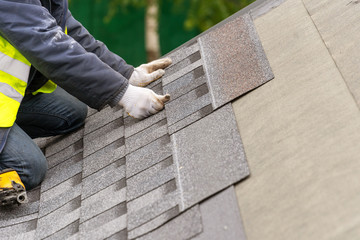Types of Residential Roofing
Asphalt shingles are one of the most common types of residential roofing in the U.S. They’ve been around since 1903 and are widely recognized as the most reliable roofing material. These shingles are best suited for regions that have mild weather. However, asphalt shingles are a good choice if you’re considering a replacement roof.

Depending on the style and materials used, asphalt shingles can last anywhere from 20 to 50 years on the average home. Commercial roofs are typically large and flat, while residential roofs have a slightly lower pitch. A commercial roof is wider and has multiple openings to accommodate heavy objects. Roofing materials are also more varied than residential roofs, and the choice of material will affect the final structure of the roof. On the other hand, a residential roof will require a different roof structure for asphalt shingles or concrete tiles, which need to be installed over heavier materials.
Gable roofs are another popular type of residential roof. They are simple in design but improve curb appeal and functionality. Shakes also have a slope on each side, allowing moisture to run off the sides quickly, keeping the roof dry and reducing water accumulation. Replacement of a gable roof can range from $7,000 to $20,000. However, the price of a new gable roof will vary widely based on the materials and location of your home.
While most residential roofing systems are relatively low-maintenance, homeowners are encouraged to inspect their roofs at least twice a year. It is best to have a professional roofing contractor inspect the roof if significant weather has occurred in the past year. A professional roofing contractor will be able to recommend the right roofing material for your home. The contractor will consider the style, function, and cost when making recommendations. This can help make the process easier.
The sheathing is the flat material that sits on top of the roof and secures it. Oriented strand board (OSB) is a common choice for roof sheathing. This material is light and inexpensive and helps support the roof’s weight. Other heavier materials are commonly used for this purpose, such as plywood. A leak barrier can protect vulnerable areas such as valleys and eaves. If the entire roof needs to be repaired, it may be possible to use a leak barrier to prevent further damage.
Roofing systems for commercial buildings are usually more complex than those used on residential properties. Commercial roofs are usually low-sloped or flat, requiring more routine maintenance and repairs. In addition, commercial roofs must consider a larger area, the weight of equipment, and potential snow loads. The design of residential roofs is simpler, but commercial roofing still requires a professional for maintenance and repair. It is important to understand the differences between residential and commercial roofs.
Roofing systems are crucial to the overall look of your house. Slate roofs can last for up to 100 years with proper care. Compared to asphalt roofs, slate roofs are relatively inexpensive and require a higher degree of expertise to install. However, slate roofs are not the most economical option for most homeowners. Installing slate tiles requires specialized knowledge and training and can break easily. This can also complicate rooftop maintenance and gutter cleaning.
Several other types of residential roofing are available. For example, you may want to install a green roof that covers the top of your home with vegetation. Green roofs are great for the environment as they reduce heat outside, reduce runoff, and even support pollinators. They typically last anywhere from 30 to 50 years. Another new type of roofing is solar shingles. Installing solar shingles requires additional structural support and building-integrated photovoltaics.
Another popular type of residential roofing is cedar shake. Cedar shake roofs use split logs for their shingles. Cedar shake roofs are particularly effective in hot climates and are known to resist ultraviolet rays. Cedar shake roofs are eco-friendly as they produce little runoff. Cedar shake roofs also offer some added benefits. Cedar shakes are a good choice for homes with a colonial style, Craftsman, or cottage style.
